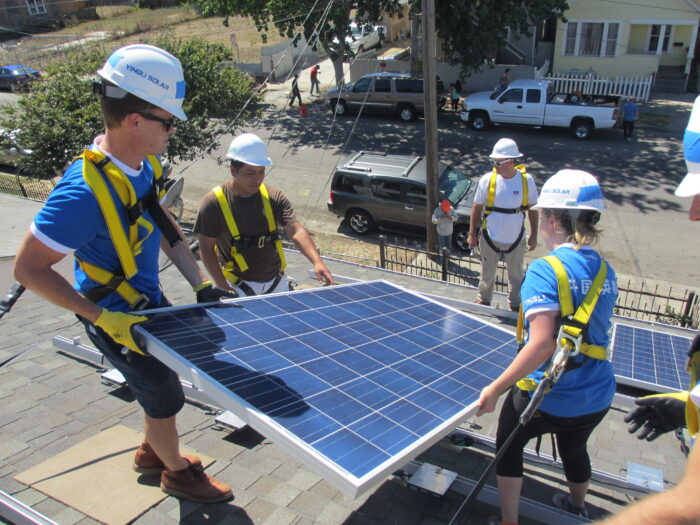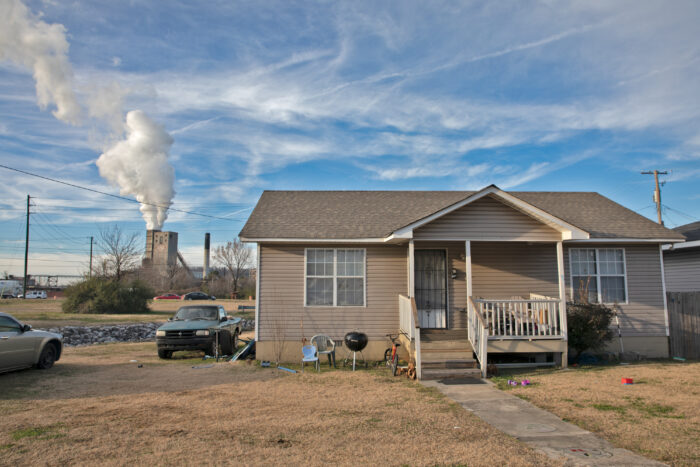Solutions start in Alabama
SELC is one of the most effective environmental organizations in the South. For 37 years, our place-based approach has made us the fiercest watchdog for our region’s natural treasures and rich biodiversity. Because of this impressive track record, SELC can steer national policy on clean energy, clean water, public lands, and more. Today, we are accepting the mantle of transforming our region’s impact on climate change and addressing a history of environmental injustice. Largely thanks to SELC and our partners, we are making room for fair, renewable energy in Alabama, stopping pollution at its source, and helping ensure clean water and clean air for all, from the Appalachian foothills to the Gulf Coast.
Removing barriers for solar power in Alabama
SELC is pressing hard to get solar power on track in one of the sunniest states in our nation. Rooftop solar is on the rise in the South, but Alabama is lagging far behind because the state’s largest utility company hits customers who want to go solar with punitive, unjust, and unnecessary fees. Alabama Power’s monthly fee has limited the rights of homeowners and businesses to use solar power on their properties to generate clean energy and lower their electric bills by significantly reducing customers’ expected savings, making it impractical to invest in solar power. After state regulators doubled down on their support for this regressive policy, SELC and partner groups went to federal court to challenge the Alabama Public Service Commission’s approval of this tax on clean energy.

Working to jumpstart a transition to clean energy
SELC is pushing back against Alabama Power’s over $1.1 billion proposed natural gas expansion, which would lock the state into fossil fuels for decades and slow the expansion of renewable energy. As the rest of the South, including the utility’s own parent company, moves away from fossil fuels, the Public Service Commission’s approval of this plan gives a green light to additional carbon pollution in Alabama. SELC and partners are challenging this approval in district court, requesting that the utility reassess its need, justify its refusal to approve solar plus battery storage, and implement protections for ratepayers.
Fair energy for Alabama
Energy burdens—through a combination of low incomes with high energy costs—plague residents in parts of Alabama more than almost anywhere else in the country. These households often lack access to affordable clean energy solutions, like incentives to upgrade cooling systems, that could help lower their energy bills. SELC recently produced a data-rich map of the Central Alabama Electric Cooperative service territory to show where customers are suffering with the highest energy burdens, to demonstrate this complex problem with clarity and power, and to help our partners advocate for policy changes that address unfair energy burdens.
Addressing coal ash pollution at Plant Barry
Thanks to SELC’s pioneering work, utilities across the South are now committed or mandated to clean up over 270 million tons of coal ash. Alabama is the only state in our region where no coal ash pits are slated for excavation, and Alabama Power wants to cap these leaking, toxic pits in place and let them continue polluting our water for decades to come. SELC and our partners are fighting for the removal of over 21 million tons of coal ash at Plant Barry, where coal ash is sitting in groundwater upstream from Mobile Bay in an area vulnerable to significant rainfall and hurricanes.
Unjust burdens of pollution in North Birmingham

Two of the 14 U.S. coking plants sit two miles apart in a majority Black neighborhood in suburban Birmingham. For 10 years, EPA and local officials were aware of dangerous levels of benzene leaking from Drummond’s ABC coke plant but did not alert the public. SELC and partners recently reached a settlement with EPA, the health department, and Drummond, requiring a robust monitoring program, ensuring the company will fix all leaks as required by law.
Reining in natural gas
SELC and our partners are questioning TVA plans to build three new gas-fired turbines in Colbert County. For over 60 years, TVA operated a large, coal-fired power plant on the Alabama side of the Tennessee River. Now, the utility wants to replace the Colbert coal plant with another fossil fuel, ignoring clean energy alternatives and continuing to place the burden of this pollution on the surrounding communities. We are pushing back, highlighting that the federal utility’s plans to site these polluting facilities in these neighborhoods directly conflict with the Biden administration’s zero-carbon and environmental justice goals.

Cleaning up toxic pollution at Maxine Mine
Pollution from inactive coalmines threatens Alabama’s rivers and streams with leakage of toxic chemicals—like sulfuric acid—into waterways. SELC and partners secured a federal court ruling against Drummond Coal, whose abandoned Maxine Mine was found in violation of the Clean Water Act. We are now pursuing additional clean water infractions and asking the court to order a full cleanup of the toxic pollution flowing into Locust Fork.
Restoring core federal protections
For four years, SELC stood strong against an unprecedented assault on our nation’s environmental protections. The Biden administration has promised to restore safeguards under the Clean Water Act, the National Environmental Policy Act, and other critical laws. But with endless problems and competing priorities in D.C., it is up to us to keep our leaders on track and to protect vulnerable Southern resources on the ground while we help ensure the restoration of stronger federal standards.
